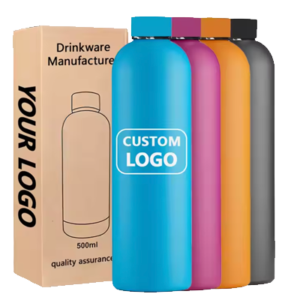What is lead-free soldering?
In the development of soldering materials, tin-lead alloy has always been the best and cheapest welding material, and it can meet the requirements of welding quality and reliability. However, with the strengthening of human awareness of environmental protection, the harm of “lead” and its compounds to human health and environmental pollution has been increasingly valued.
Table of Contents
ToggleI. What is lead-free soldering?
Lead-free water bottle manufacturing primarily refers to the use of lead-free soldering techniques. Lead-free soldering eliminates lead from the welding process, reducing environmental and health risks compared to traditional lead-based soldering.
By replacing conventional leaded solder with eco-friendly alternatives, this method minimizes potential harm to both the environment and human health. Additionally, lead-free soldering aligns with international environmental regulations, such as the EU’s RoHS directive, making it a more sustainable and compliant choice for brands and vacuum bottle manufacturers.
At present, there are mainly two forms of lead-free processes in the vacuum flask industry: one is the use of lead-free soldering flux (glass beads), and the other is the use of true lead-free stainless steel beads. After the evacuation is completed, the soldering flux is used to fully melt and seal the sealing hole, ensuring a flat surface without defects such as bubbling or sinking.
Currently, glass beads are more widely applied as lead-free soldering fluxes in the vacuum flask industry. The low-melting-point glass material can melt at a relatively low temperature to form a firm welding joint. Meanwhile, its excellent fluidity and sealing performance effectively fill the welding gap, ensuring the airtightness and water tightness of the flask body. Additionally, glass has high chemical stability, making it less likely to react with the flask materials, thus guaranteeing the long-term durability of the welded part. Stainless steel beads represent a more advanced lead-free welding material, as their composition is identical to that of the inner liner and outer shell of vacuum flasks, hence the term “true lead-free”.
Stainless steel beads feature a higher melting point and excellent corrosion resistance, enabling them to withstand greater mechanical stress and harsher usage environments.
The glass bead process still relies on soldering flux, while the stainless steel bead process truly achieves the environmental goal of “lead-free”. Moreover, since the bottom of a vacuum flask typically has a large indentation that needs to be covered by a stainless steel patch, the glass bead process creates a larger groove, requiring additional patching and increasing production complexity and time costs. In contrast, the stainless steel bead process produces a smaller groove, simplifying the production flow, improving overall efficiency, and offering a more concise and aesthetic bottom design that meets the high appearance requirements of the premium market.
II. Why use lead-free soldering?
The US Environmental Protection Agency (EPA) has classified lead and its compounds as one of the 17 chemical substances that seriously endanger human life and the natural environment, and lead can enter the food chain of animals or humans through infiltration into the groundwater system. In daily work, the human body can absorb lead or its compounds through skin absorption, breathing, and eating. When these substances reach a certain amount in the body, they can affect the normal synthesis of proteins in the body, damage the central nervous system, and cause symptoms such as nervous and regenerative system disorders, stupor, anemia, intellectual decline, hypertension, and even infertility. Lead poisoning belongs to heavy metal poisoning, and it also has the problem of being non-excretable and gradually accumulating in the human body.
The following are several significant characteristics of lead-free soldering:
1. Environmentally friendly
Lead-free soldering is a more environmentally friendly soldering technology. Lead is a hazardous substance that poses potential risks to human health and the environment. Lead-free soldering eliminates the environmental pollution and hazards caused by lead, which conforms to the global trend of environmental protection laws and regulations.
2. Improved reliability
Lead-free soldering has improved the reliability of the soldering interface. Traditional lead soldering has reliability problems, such as thermal shock cracks, delayed fracture and so on. Lead-free soldering adopts new soldering materials and processes, which can provide better soldering strength and long-term reliability of electronic components.
3. Optimized electrical performance
Lead-free soldering can also significantly optimize electrical performance. The presence of lead can have a certain negative impact on electrical performance, such as resistance, inductance and capacitance. The use of lead-free soldering materials reduces contact resistance and improves the quality and stability of signal transmission.
4. Compliance with international standards
With the global demand for environmental protection, lead-free soldering has become a requirement of international standards and regulations. The EU’s RoHS Directive and the US standard J-STD-020, etc., both explicitly require the use of lead-free soldering materials and processes in electronic manufacturing to ensure product sustainability and market access.
Ⅲ.The application of lead-free soldering in the field of bottles
Lead-free soldering is widely used in various fields of electronics manufacturing, including TV, mobile phones, computers, automotive electronics, medical devices and so on. Lead-free soldering has become the mainstream of electronic manufacturing, providing strong support for product quality, reliability, and environmental friendliness.
With green and healthy becoming the trend, lead-free soldering has gradually begun to appear in the bottle industry. In the field of bottles, lead-free soldering is mainly applied to welding, using welding technology to combine the inner and outer shells together to improve the strength and stability of the bottles, and increase the service life of the product and added value. As the interior of the bottles often needs to be in contact with hot water, lead-free materials can also ensure product safety and hygiene to a certain extent. In addition, it can also improve the quality and reliability of the bottle, and increase the product’s added value and competitiveness.
Haers is currently the only company that has developed lead-free solder and processing methods that can be used on kids’ water bottles and stainless steel bottles,The use of lead-free soldering technology can effectively improve the quality and reliability of the bottles, but also in line with international environmental standards, which undoubtedly proves the strength and product quality of Haers.
Overall, the application of lead-free soldering in the field of bottles is of great significance. As people’s requirements for environmental protection and health continue to improve, lead-free soldering will become an important trend in the manufacture of water bottles, providing insulated water bottle manufacturers with higher quality, more reliability, and more environmentally friendly products.
At present, among factories capable of lead-free process production, the technology using lead-free soldering flux for welding is relatively mature, with manufacturers adopting this technology remaining the mainstream. In contrast, the stainless steel bead process has a high technical threshold, requiring substantial capital investment and technical accumulation. Currently, only a few leading brands employ this lead-free process. This approach complies with international environmental standards, serving as a strong testament to a company’s capabilities and product quality. It also reflects the challenges and opportunities in the industry’s technological upgrading and environmental transformation.


